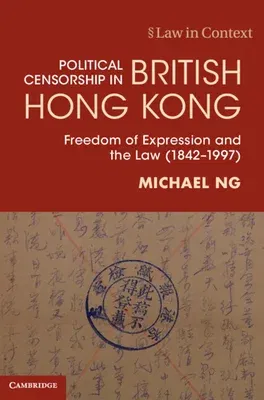Michael Ng
(Author)Political Censorship in British Hong Kong: Freedom of Expression and the Law (1842-1997)Hardcover, 4 August 2022

Qty
1
Turbo
Ships in 2 - 3 days
Only 2 left
Free Delivery
Cash on Delivery
15 Days
Free Returns
Secure Checkout

Part of Series
Law in Context
Language
English
Publisher
Cambridge University Press
Date Published
4 Aug 2022
ISBN-10
1108830021
ISBN-13
9781108830027
Description
Product Details
Author:
Book Format:
Hardcover
Country of Origin:
GB
Date Published:
4 August 2022
Dimensions:
23.39 x
15.19 x
2.21 cm
ISBN-10:
1108830021
ISBN-13:
9781108830027
Language:
English
Location:
Cambridge
Publisher:
Series:
Weight:
476.27 gm